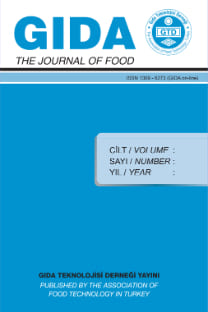Bazı Antibiyotiklerin Yoğurt Bakterilerinin Asit Geliştirme Özellikleri Üzerine Etkileri
Bazı antibiyotiklerin (penisilin, streptomisin, oksitetrasiklin, tetrasiklin ve klortetrasiklin) yoğurt bakterilerinin sütteki asit geliştirme özellikleri üzerine etkileri incelenmiştir. Streptococcus thermophilus ve Lactobacillus bulgaricus kültürü ile bunların karışımıyla elde edilen yoğurt kültürünün, denenen antibiyotik konsantrasyonlarında gerçekleştirdikleri asit gelişimleri titre edilebilir asitlik ve pH olarak saptanmıştır. Asit gelişimleri, örneklerin 44 oC de 0, 2 ve 3 saat inkübasyonu sonunda test edilmiştir. Yoğurt kültürü incelenen antibiyotiklerden en az etkilenen örneği oluşturmuştur. Buna karşın yoğurt kültürü 0.1 IU penisilin/ml süt ve 10 µg oksitetrasiklin/ml süt konsantrasyonlarında hemen hemen hiç asit gelişimi gösterememiştir. Sütün ml’sindeki 1 µg tetrasiklin, 10 µg klortetrasiklin ve 1 µg oksitetrasiklin dozlarında da başlangıca göre fazlaca bir asit gelişimi görülmemiştir. Diğer taraftan sütün ml’sindeki 0.01 IU penisilin, 10 µg streptomisin, 0.1 µg oksitetrasiklin, 0.5 µg klortetrasiklin ve > 0.05 µg tetrasiklin yoğurt kültürünün oluşturduğu asit gelişiminde yaklaşık %20-50 dolaylarında gerilemeye yol açmıştır.S. thermophilus incelenen antibiyotiklere en duyarlı kültür örneğini oluşturmuştur. Buna karşın, L. bulgaricus streptomisine S. thermophilus’dan daha fazla bir duyarlılık göstermiştir. S. thermophilus’un sütün ml’sindeki 0.01 IU penisilin, 10 µg streptomisin, 1 µg oksitetrasiklin, 0.5 µg tetrasiklin ve 10 µg klortetrasikline duyarlı olduğu saptanmıştır.
Effects of some Antibiotics on Acidification Properties of Yoghurt Bacteria (Turkish with English Abstract)
The effects of some antibiotics (penicillin, streptomycin, oxytetracycline, tetracycline and chlortetracycline) on the acid development of yoghurt starter bacteria in milk were studied. Cultures of Streptococcus thermophilus and Lactobacillus bulgaricus strains and mixture of both microorganisms in all experimental antibiotic milks were tested for titratable acidity and pH after incubation for 0, 2 and 3 hours at 44 oC. The results indicate that yoghurt was the most resistant culture to the antibiotics. However, 0.1 IU of penicillin and 10 µg of oxytetracycline Per ml of milk inhibited the acid production of yoghurt culture. Concentrations of 1 µg of tetracycline; 10 µg of chlortetracycline and 1 µg of oxytetracycline Per ml of milk also caused poor starter activity with very little acid production. A reduction of 20-50% of acid production was observed with the samples using 0.01 IU/ml penicillin; 10 µg/ml streptomycin; 0.1 µg/ml oxytetracycline; 0.5 µg/ml chlortetracycline and > 0.05 µg/ml tetracycline. The sensitivities of three cultures to antibiotics varied widely. S. thermophilus was the most sensitive culture to the antibiotics. This culture was sensitive to 0.01 IU of penicillin; 10 µg of streptomycin; 1 µg of oxytetracycline; 0.5 µg of tetracycline and 10 µg of chlortetracycline Per ml of milk. However, L. bulgaricus showed more sensitivity to streptomycin than S. thermophilus. Measured sensitivity was found approximately 1 µg/ml of milk.
